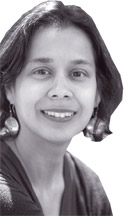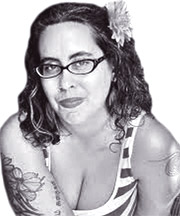CLARKE: Strong poetry volumes launched by South Asian-Canadian
writers
Piepzna-Samarasinha, Peerbaye offer powerful language, varied voices.
March is International Women’s Month — or should be. Let us read Leah
Lakshmi Piepzna-Samarasinha and Soraya Peerbaye, two South
Asian-Canadian poets who are fine in different ways.
|

Soraya Peerbaye |
|

Leah Lakshmi |
Piepzna-Samarasinha is part-Sri Lankan, part-Irish, lesbian and
lyrically political — or politically lyrical — which is a way of saying
that, like U.S. poet Walt Whitman, she sings the body — her own —
electric, shocking, enlightening.
Love Cake (TSAR, $18) is her debut as a poet, but Piepzna-Samarasinha
has been a writer, contributing to numerous anthologies interested in
“queer and trans people of colour” as well as “queer people with
disabilities and chronic illnesses.”
Women poets
Piepzna-Samarasinha has toured Grown Woman Show, her one-woman show,
throughout North America and also co-founded and co-directed a touring
cabaret, Mangos with Chili, featuring performing artists who are queer
(or trans) and coloured. The opening poem reads war as a matter of
bodily harm, not just in terms of victims, but also in terms of bearing
long-distant witness: “someday, our bodies are gonna tell everybody/just
what it was like/to live through this/how the news ripped us open/…
crashed our sound barrier/shuddered our bodies/with bombs.”
Massachusetts-raised, “Toronto-matured” and now California-based,
Piepzna-Samarasinha names no Canadians as influences. But there’s a
touch of Sri Lankan-born Michael Ondaatje in her sensuality, and also of
Trinidad-born Dionne Brand in her direct treatment of “issues.”
She names African-American and native-American women poets as
significant models; there’s also a Whitman or Allen Ginsberg sensibility
present in her use of lists: “relatives who know how to drive drunk
around all the army checkpoints”; “creaky hipped aunties”; Mission
Impossible badly dubbed in Sinhalese”; “a sea that is a ghost/cupping
100,000 tsunami bodies.”
Debt and joblessness
Piepzna-Samarasinha understands memory, history and reality as a
constant condensing or coalescence of essences, things: “Sunlight, hot
lavender flowers/sweet and musk, deep plum centres”; “Your new face
circled in flames …/that brings me here to windows,/hot pink and plum
musk flowers// thirsty, unbroken by my history/walking in a new city.”
There are love(making) poems and confessions of trauma. But also
valuable are poems that speak to our shared moment of liquidity crisis
and financial corruption: “I tell myself that Merrill Lynch can’t pay
their bills either/so why … should I worry about Mastercard, VISA and
the $16,000 line of credit?”
When her persona says, “I’m a 33-year-old woman with four jobs/$37 in
my chequing account,” she identifies a global epidemic of debt and
joblessness. Disabled in body but strong in voice, Piepzna-Samarasinha
resembles the late Nova Scotia poet Maxine Tynes.
Original manuscript
Piepzna-Samarasinha’s name is long and her book title short. Soraya
Peerbaye’s name is short and her book title long: Poems for the Advisory
Committee on Antarctic Names (Goose Lane, $19). I was a reader of the
original manuscript, so I will not write at length about Peerbaye’s
book, except to say that it is also a significant debut by a South
Asian-Canadian writer whose family home is Mauritius, an Indian Ocean
nation about 1,000 kilometres east of South Africa.
Peerbaye was partially raised in Ottawa and now lives in Toronto, but
her first collection is not just about family and her ancestral nation;
it is also about her travels to one of the still remote parts of the
world, Antarctica.
Fluently bilingual in French and English, Peerbaye also speaks the
Creole tongue of Mauritius. The result is that she is deliberate in
diction and delicate in nuance. Every word is careful; every line is
sculpted: “Pyjamaed intellectual, pillow-propped; woody giggle (of
Scrabble) and chatter of tiles, in their crushed/velvet Crown Royal
pouch; // dictionary’s fluttered lisp.”
That compositional care — and balance — reminds one of the strong art
of Elizabeth Bishop. Not one word sounds wrong. George Elliott Clarke is
a professor of literature at the University of Toronto.
Courtesy: Herald Arts &Life |





